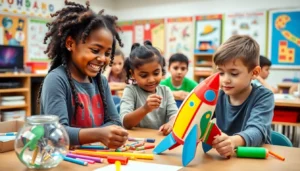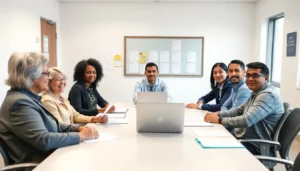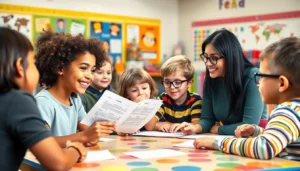Table of Contents
ToggleIn a world where traditional education often feels like a never-ending series of standardized tests and rigid curriculums, the National Alternative Education Association (NAEA) shines like a beacon of hope. This organization champions innovative learning methods that cater to diverse student needs, proving that education doesn’t have to be one-size-fits-all. They believe that every student deserves a chance to thrive in an environment that recognizes their unique talents and challenges.
Picture a classroom where creativity flourishes and students engage in hands-on learning. The NAEA isn’t just about breaking the mold; it’s about smashing it to pieces and building something extraordinary in its place. By promoting alternative education models, they empower educators and inspire students to embrace their individuality. It’s time to rethink education and explore the exciting possibilities that lie beyond conventional boundaries.
Overview of National Alternative Education Association
The National Alternative Education Association (NAEA) focuses on promoting innovative education methods that cater to diverse student needs. The organization believes that education must adapt to individual students, fostering environments where they can thrive.
Mission and Vision
NAEA’s mission emphasizes redefining education by valuing creativity and individual learning paths. It envisions a world where education accommodates all students, recognizing their unique skills and challenges. This approach advocates for flexibility, allowing schools to customize learning experiences. NAEA aims to inspire both educators and students by showcasing alternative educational models that empower personal growth and exploration.
Key Initiatives
NAEA develops several key initiatives to support alternative education. These initiatives include professional development programs aimed at equipping educators with essential skills. Workshops focus on innovative teaching strategies that promote engagement and individualized learning. Collaboration with local communities emphasizes resources and partnerships necessary to enhance educational experiences. Educational conferences hosted by NAEA provide platforms for sharing best practices and fostering networks among educators within the alternative education field.
Benefits of Alternative Education
Alternative education offers numerous advantages that foster a supportive learning environment. Many students experience increased engagement, motivation, and creativity in non-traditional settings.
Improved Student Engagement
Students often show higher levels of engagement in alternative education settings. Programs encourage active participation, allowing learners to take ownership of their education. Innovative teaching methods stimulate interest and curiosity, leading to deeper connections with the material. Increased attention spans and motivation arise from personalized approaches. As a result, students develop a passion for learning and an eagerness to explore new subjects.
Tailored Learning Approaches
Customized learning approaches cater to unique student needs and strengths. Schools focus on individual learning styles, ensuring each student receives the support necessary to succeed. Differentiated instruction helps educators address varying abilities within the classroom. When curricula adapt to learners, students benefit from an inclusive atmosphere that fosters growth. Flexibility in learning paths helps maintain enthusiasm and progress.
Programs Offered by the Association
The National Alternative Education Association offers various programs that enhance alternative education practices and support educators. These programs focus on professional development and resource availability to meet the unique needs of students.
Professional Development
Professional development stands at the forefront of NAEA’s initiatives. Educators gain access to specialized training workshops and online courses that emphasize innovative teaching methods. These opportunities improve instructional strategies, allowing educators to implement flexible and engaging curricula. Furthermore, mentoring programs connect experienced educators with those new to alternative education, fostering collaboration and sharing of best practices. Certifications in alternative education further validate the expertise of educators, equipping them to better serve their students.
Resources and Support
Resources and support play a critical role in achieving the NAEA’s objectives. The association offers a wealth of materials, including access to research articles and educational toolkits designed for alternative education. Additionally, NAEA facilitates connections between schools and community organizations, enhancing local educational resources. An active online community provides a platform for educators to share experiences and seek advice. By creating a network of support, NAEA strengthens alternative education by ensuring that educators have the necessary tools to inspire and engage their students effectively.
Impact on Students and Communities
Alternative education significantly affects students and communities by providing tailored learning experiences. This approach fosters a positive learning atmosphere where students thrive.
Success Stories
Many success stories illustrate the positive impact of alternative education. A student with a unique learning style flourished in a project-based curriculum that fit their needs. Similarly, another student overcame personal challenges and gained confidence through supportive mentoring programs. These examples showcase the transformative power of personalized education, highlighting improvements in academic performance. Communities benefit as well; successful students often engage in local initiatives, boosting community involvement. With these achievements, alternative education stands out as an effective solution for diverse learner populations.
Long-term Outcomes
Long-term outcomes of alternative education reveal powerful benefits for students and communities alike. Graduates often exhibit greater resilience and adaptability, skills essential in today’s job market. Additionally, many students pursue higher education, leading to increased career opportunities. A correlation exists between alternative education participation and positive community contributions, such as volunteering or leadership roles. Sustained engagement in lifelong learning is common among students who experienced alternative methods. Communities witness reduced dropout rates and improved overall educational attainment, signifying a stronger future for all involved.
The National Alternative Education Association plays a crucial role in reshaping the educational landscape. By championing innovative learning methods and fostering creativity, it empowers educators and students alike. The organization’s commitment to personalized education not only enhances student engagement but also nurtures individual talents.
Through its various initiatives and resources, NAEA ensures that alternative education continues to thrive. This approach not only benefits students but also strengthens communities by promoting lifelong learning and resilience. As alternative education gains recognition, the impact of NAEA’s efforts will undoubtedly lead to a brighter future for countless learners across the nation.






